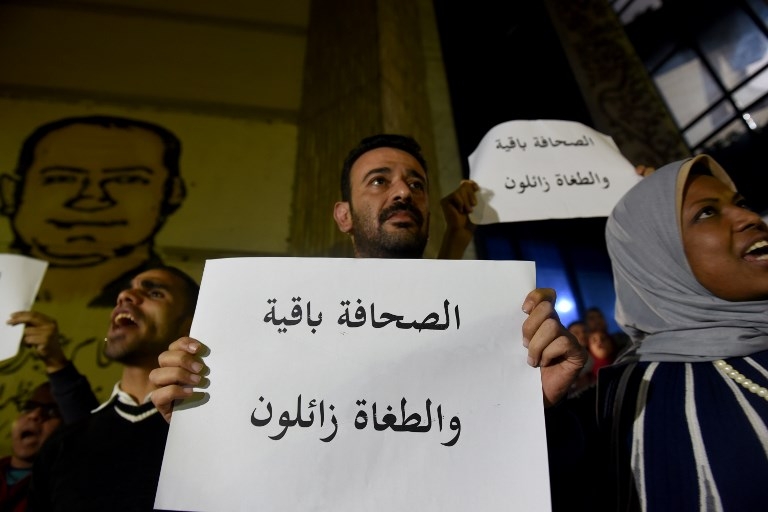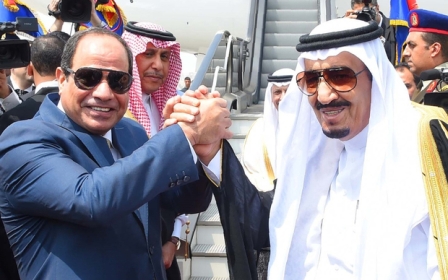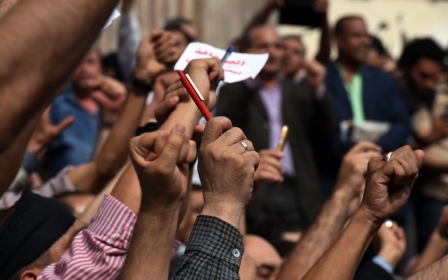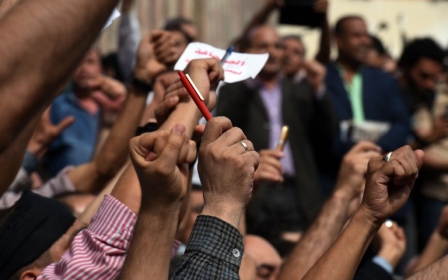Egypt trying to 'control narrative' with media shutdowns, rights groups say

The current Egyptian government has gone further than former dictator Hosni Mubarak in curtailing press freedom, Amnesty said on Tuesday.
In the last two days, authorities have blocked access to even more news websites and VPN-providers, bringing the total to 62, the Association for Freedom of Thought and Expression NGO said on Monday.
Qatar's Al Jazeera and independent Egyptian news site Mada Masr, both critical of the government, were among those banned during the initial move back in May.
The local news websites most recently made inaccessible include al-Badil and al-Bedaya, which have also criticised Egyptian government policies.
"The latest clampdown on digital media is further evidence of Egypt's age-old police state tactics in motion. Even in the darkest days of the repressive Mubarak era the authorities didn't cut off access to all independent news sites," said Najia Bounaim, Amnesty International's North Africa campaigns director.
Even in the darkest days of the repressive Mubarak era the authorities didn't cut off access to all independent news sites
- Najia Bounaim, Amnesty'campaign director
The moves, Amnesty said in a statement, were part of the Egyptian government's "onslaught against media freedom" which had now moved to the digital sphere, it said, in "an attempt to eliminate the country's last remaining spaces for criticism and free expression".
"With this move the Egyptian authorities seem to be targeting the few remaining spaces for free expression in the country.
"It shows just how determined the authorities are to prevent Egyptians from accessing independent reporting, analysis and opinion about Egypt. The authorities must immediately stop arbitrarily blocking news websites."
Coordinated effort to threaten journalists
The government is desperate to "control the narrative", according to Sherif Mansour, the Committee to Protect Journalist's Middle East director said on Tuesday.
Speaking to MEE, Mansour said that, "It is clear from their systematic targeting of government critics in the media that the government goes after anyone who criticises government oppression of demonstrators, crackdown on speech, [or those who] oppose the government actions on the two Red Sea islands, and its handling of terrorist attacks."
"The government wants to control the narrative, including on several issues of public interest."
The government wants to control the narrative, including on several issues of public interest
- Sherif Mansour, CPJ director
Mada Masri's editor-in-chief, Lina Attallah, told Amnesty that she believes the site was blocked because it publishes well-researched investigations based on verified information.
"We publish what authorities don't want people to read," she said.
Bedaya's chief editor, Khaled Elbalshy, speaking to AFP on Tuesday, also linked the timing of this recent ban on a debate currently under way in parliament, on the fate of the two Red Sea islands, which Egyotian president Abdel Fattah al-Sisi controversially promised to Saudi Arabia, amid accusations he had sold the country.
A parliamentary committee on Tuesday passed the treaty on Tiran and Sanafir. It will now be debated by the defence committee, and then the full house.
CPJ has recently documented steps undertaken by the Egyptian state to monitor and harass journalists online.
"The actions taken by Egyptian authorities are part of a coordinated effort to threaten, intimidate, and censor journalists and discussions of issues of public interest in Egypt," Mansour said.
"Egypt is using technology, which was a major tool used by a wide range of journalists and activists, as a tool for censorship."
Reporters Without Borders - which calls Egypt "the world's worst jailer of journalists" – ranks the country 161 out of 180 countries, in its 2017 annual tally.
New MEE newsletter: Jerusalem Dispatch
Sign up to get the latest insights and analysis on Israel-Palestine, alongside Turkey Unpacked and other MEE newsletters
Middle East Eye delivers independent and unrivalled coverage and analysis of the Middle East, North Africa and beyond. To learn more about republishing this content and the associated fees, please fill out this form. More about MEE can be found here.




